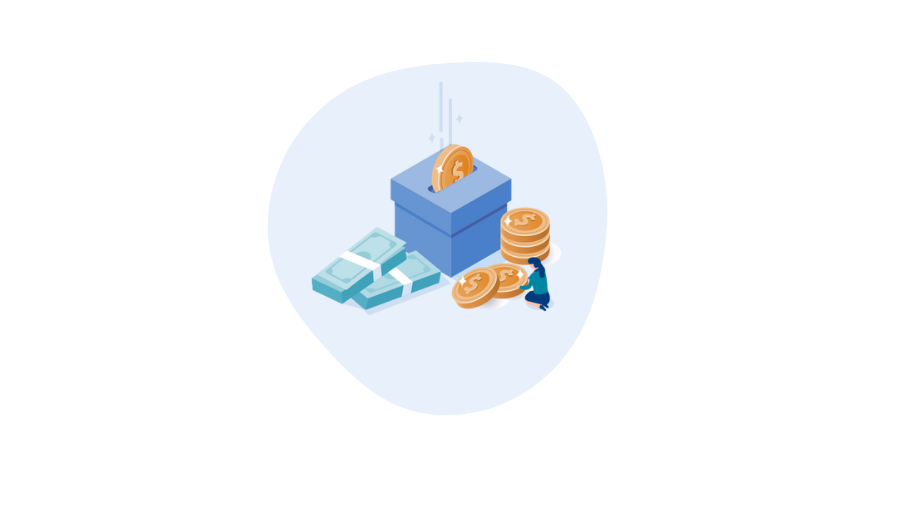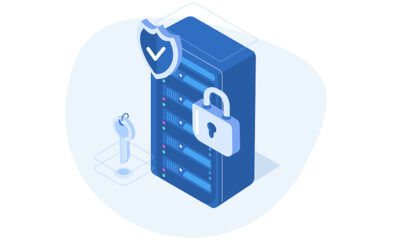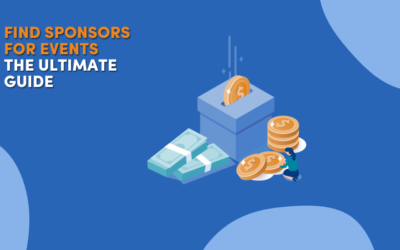The event is set and you want to appeal to as many visitors as possible. The location, date, period and theme have been decided, but you are wondering how to price your event tickets correctly in order to appeal to your target group in the best possible way? Not too expensive, but not too cheap either. Should there be different price levels or should you work with promo codes? And do I price virtual events the same as on-site events?
Finding the right pricing strategy for B2B events is not that easy, though, so this article will help you with that.
How expensive are tickets for B2B events?
A ticket for DMEXCO, Germany’s largest digital trade show, cost 149 euros per person. For the German Trade Congress, you have to pay 1.490 euros for a participant ticket, and if you want to be at the World Economic Forum in Davos, you have to be prepared to pay 28.000 US dollars.
These figures clearly show that there is no “one” ticket price and that prices vary greatly depending on the event. In 2022, ticket prices for the most important marketing events in the DACH region ranged from zero euros to a visitor ticket for 1.590 euros.
Pricing models: 3 different approaches
Your pricing model can be based on different approaches – from the cost-based approach to the demand-based approach. We recommend using the latter.
- Cost-oriented approach
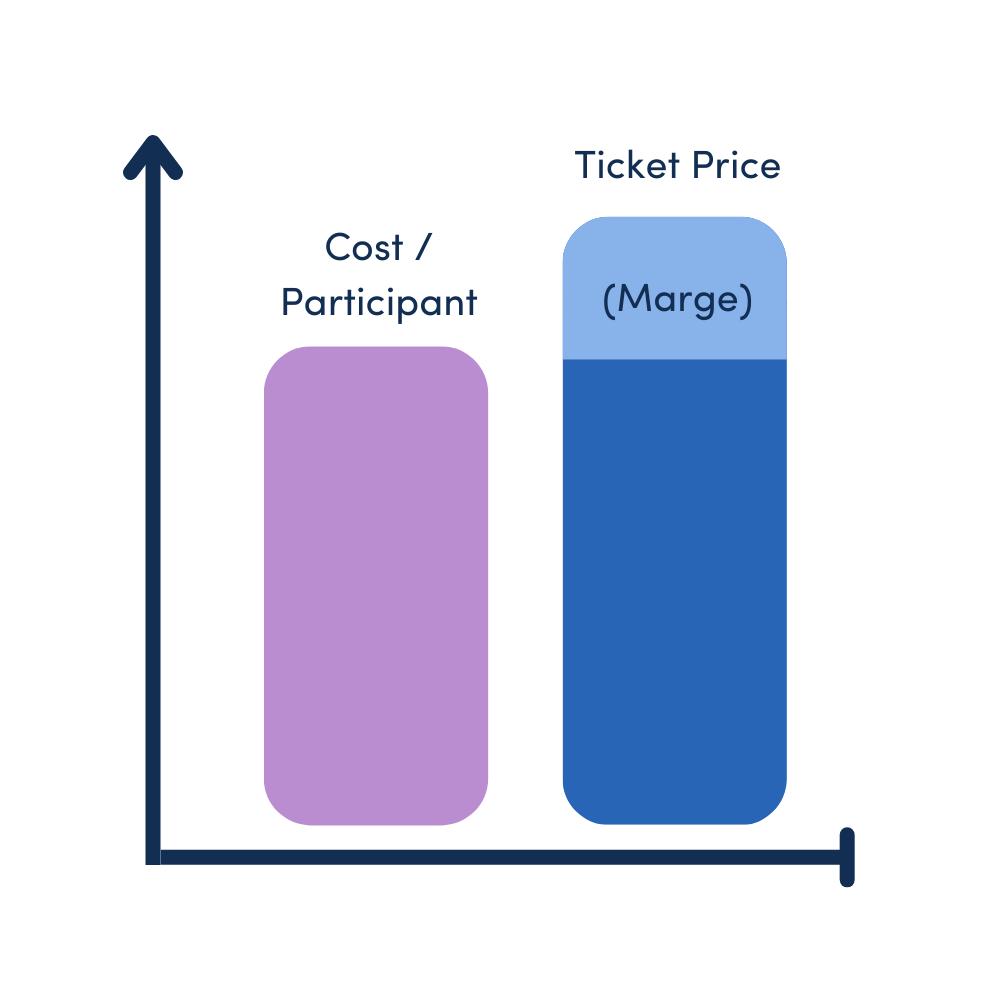
This pricing strategy for determining the ticket price is relatively simple. You determine the total cost of your event and set a certain margin above the cost.
- Competition-oriented approach
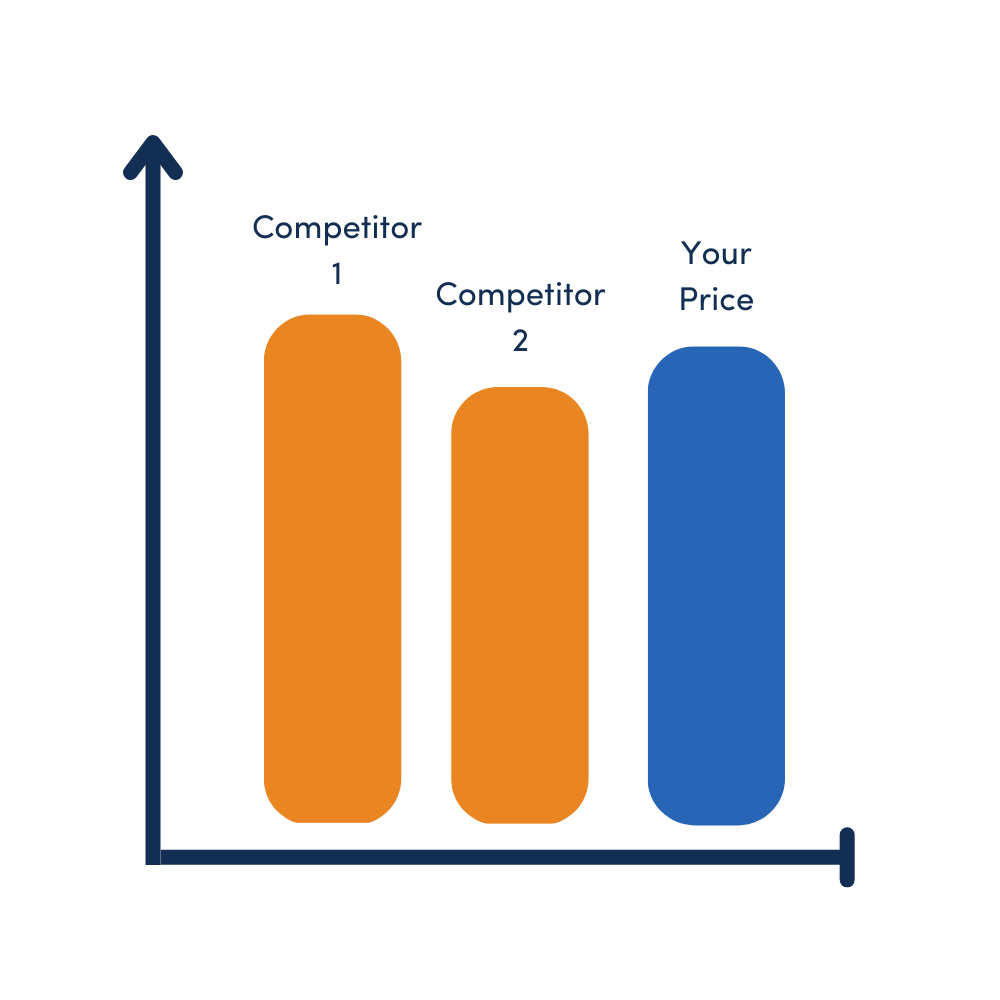
With this strategy, you put your ticket price in relation to the prices of your competitors.
- Nachfrageorientierter Ansatz
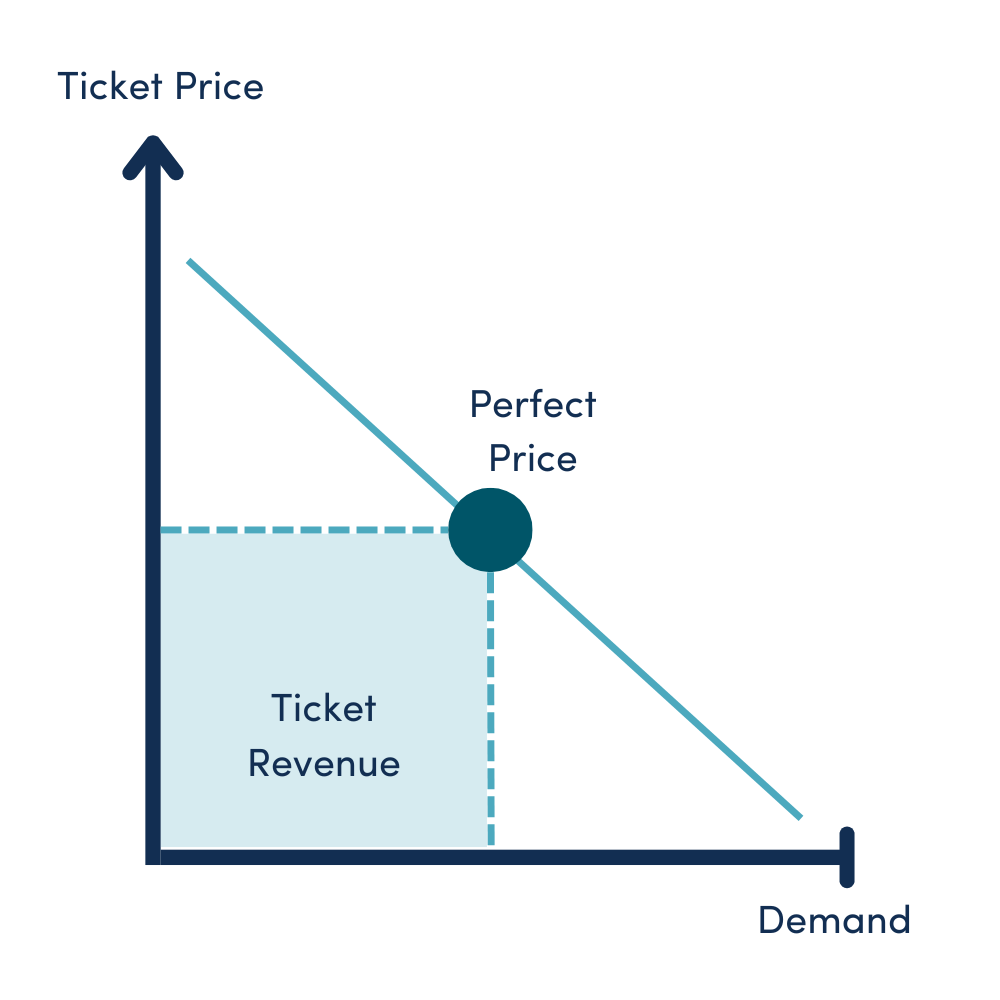
In this method, you determine the perceived value of your event among customers. You must take into account the competition, market conditions and the quality of your event and estimate the perceived value of your event. This strategy is the most difficult to implement, but it leads to an optimally leveraged pricing potential.
What factors do I need to consider when calculating the price?
The challenge is to find a price that makes you competitive, while attracting attendees and bringing you closer to your event goals.
Consider the goal of your event
What do you want to achieve with your B2B event? Do you want to raise your profile or build a brand image? Do you want to strengthen the business relationship, promote your products or stand out from the competition? Depending on which goal you are pursuing, the right pricing strategy will help. If you want to appeal to a large crowd, low ticket prices are suitable. For exclusive events, higher ticket prices are appropriate. If you want to present your products or generate leads only, a free event could also be an option.
Determine the value of your own event
With pricing, you also determine the value of your own event. Prices serve as a tool for positioning, because participants tend to form a judgment based on the price. This is not to be neglected! So prices can definitely influence the perception of an event. If you price your event high, you build an image of quality and exclusivity. If a low entrance fee is possible at your event, you create access for more customers, and at the same time your event loses exclusivity.
Identifying the customers’ willingness to pay
With a detailed market analysis that you conduct yourself or with a market research company, you can find out how many visitors would spend on your event. If you have already held several events, you can also draw on empirical values or conduct opinion surveys among participants.
Take costs into account
The willingness of your potential customers to pay is the most important factor for you, but of course you also have to keep an eye on the costs incurred and cover them. You need to be able to break down your costs accurately and know where you are coming from.
Dynamic Pricing Process: Yes or No?
Do you want a fixed price or should your prices vary depending on the time in advance? Or do you want to work with discounts or promo codes? Ask yourself the basic question of whether you want your pricing process to be dynamic. If yes, then you have two basic methods depending on your goals:
- Skimming: In this method of pricing strategy, you choose a high ticket price that can be lowered by means of time discounts or promo codes.
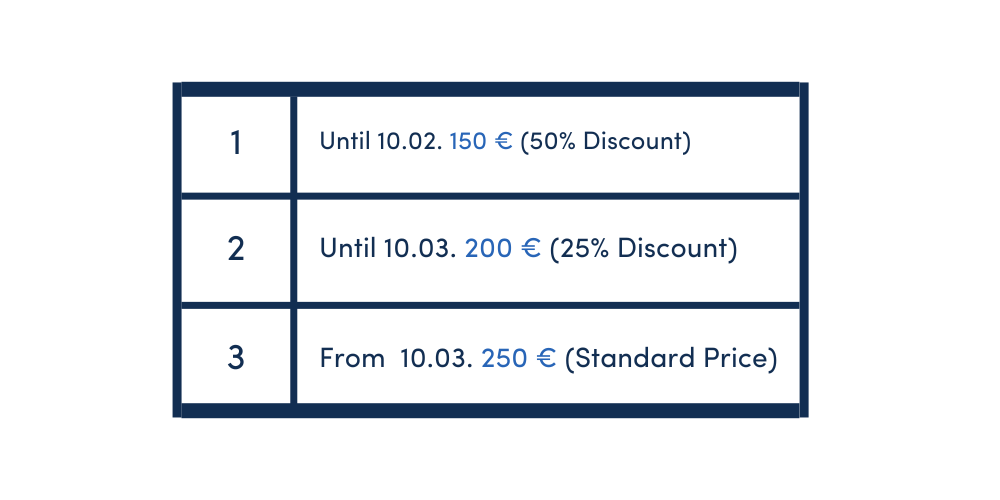
- Penetration: Here you choose a low ticket price (for example, early bird tickets) so that you can quickly encourage many customers to buy. As the event draws closer, the price is gradually increased in this pricing policy.
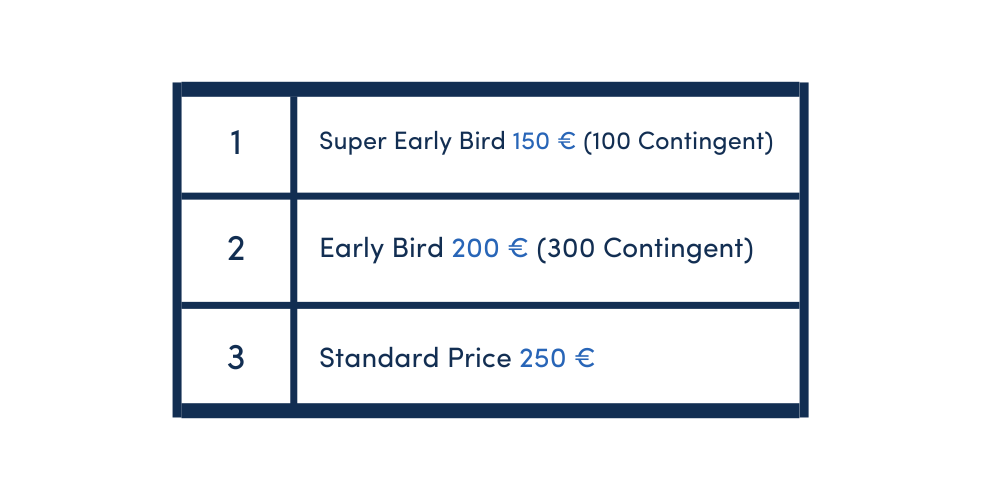
The different ticket sales strategies
To get closer to your defined event goals, you have several options to improve your ticket sales with the following Sales Strategies.
Pre-sale levels: Early Bird or Late Bird
Many events offer pre-sale levels. In this pricing model, the ticket price is lower than the regular price. The closer the event gets, the more expensive the event ticket becomes. In addition to early-bird tickets, there are also super-early-bird tickets or early-early-bird tickets to make even more gradations possible. This way, you can motivate a large crowd to buy tickets at a very early stage with an attractive price. In contrast, B2B organizers such as CONTENTIXX do not offer Early Bird tickets, but only Late Bird tickets in addition to the regular price.
Odd-Even-Pricing
You all know this psychological price trick from the supermarket. Odd-even pricing means working with odd or fractional numbers. You don’t sell your ticket for 100 euros, but for 99 euros or for 49.99 euros instead of 50 euros. In this way, you create the impression of a lower price and encourage people to buy.
Bundles or combination tickets
If events last longer than one day or you offer different themes and rooms, you can create bundles or combination tickets. Cheaper 2-day tickets are gladly sold to ensure enough visitors:inside on both days and ultimately sell a higher priced ticket. Also the OMT2022, for example, offers company bundles that allow companies to buy online tickets for up to 100 employees for 1790 euros
Up-Sells
Encourage a higher-value sales deal with this strategy. This can be certain combo tickets, event tickets with exclusive conferences or extra matchmaking rooms that make networking efficient. Create different packages for different needs and budgets, or even try to sell tickets with add-ons like hotel accommodations and transportation.
Discount Strategies
For example, you can set discounts for members of certain associations. Or you can encourage additional ticket purchases by giving each additional participant from the same company a 100 euro discount on the ticket registration fee. If you want to work with discounts in your ticket sales, you must of course take this into account at the beginning of your pricing strategy, because discounts are always deducted directly from the sales price and reduce the profit.
Promo Codes
Promo codes are perfect for marketing campaigns to promote your event on social media, for example. With time-limited promotions, interested parties can save on the ticket price.
How should I price virtual events?
Time and again, the question arises as to how high ticket prices for virtual events should be? 70 percent of the ticket price of the on-site event? Or even free of charge? No! If you want to implement a virtual event well, you also have to invest a lot of budget. Depending on the online event, the pure planning effort is almost as high as for onsite events. Although there is no room rental or catering, an event platform and good technology also have their price. If you plan a hybrid event, the costs and effort are even higher.
Always think about the image and value of your event. If you were to offer your event for free, how would that affect your image? A comparison: Apple would never come up with the idea to lower the costs for the new iPhone just because the employees have been working from home offices since the pandemic.
The added value for the participants is no less online than at an on-site event! An exciting program with knowledge transfer, great speakers and workshops are possible online without any problems. And did you know? Networking is even more efficient and easier to implement online than at face-to-face events thanks to matchmaking. A big plus for your B2B participants!
There will always be critics who say that you get less at an online event than at on-site events. However, that’s just a matter of reasoning. After all, networking is easier with online tools and can be planned and implemented more efficiently. You can also highlight the cost advantage attendees have by not having to drive or take the train to the event location and even save a few nights in hotels. If you have a value-added event program and argue well, there is no reason to sell an online ticket at a lower price. If you sell both event types, on-site and online tickets, you can also sell the presence part as a special add-on, for example.
For which online events do free tickets make sense?
There are free events where free attendance makes perfect sense, such as product launches and webinars that focus on lead generation instead of ticket revenue. Also at events that are funded by co-organizers and their advertising. Here, the companies’ goals clearly lie elsewhere, so they can and want to offer free participation.
How do I know if I have found the “right” price?
If your price was too high or too low, it may be reflected in too few signups and visitors. Of course, you can also verify your pricing strategy based on your sales. However, sales are not the only key figure, because success is always defined by the goals you set.
The crucial question in measuring success should therefore be: What is your most important goal of the event? What is it all about for you? Do you want to win new customers? Are you interested in establishing basic contacts or in building and expanding your reputation?
The best way to determine whether you have achieved these goals is to use event KPIs such as:
- Registrations for your event
- Actual attendees
- Leads
- Links and mentions
- Articles about the event
- Revenue generated by the event
- Satisfaction of the participants
Based on the metrics, you can take an assessment after your B2B event to see how successful your event was and whether you might need to adjust your pricing strategy for the next event.
Conclusion
Determining the right ticket price for your events is completely individual and depends on your event and your goals. In any case, it is not enough to simply add up the costs and add a profit margin. Remember that the price of your tickets should always tend to match the perceived value of your customers (i.e., according to the demand-driven approach) in order to maximize ticket sales and profit. Also remember: the price is a tool for positioning!
Consider a pricing strategy that suits your purposes and communicate it openly. Different sales strategies such as sales level models, bundles, discounts, promo codes, and upselling concepts can help you price your offer attractively. For virtual events, you should not necessarily set up lower ticket prices, but point out the advantages of online events.
With Converve’s digital event platform, you can run events entirely online or hybrid. In addition, Converve offers you a customizable matchmaking platform that allows you to cover all areas of your digital events. Feel free to contact us now – whether you’re already planning your next event or just have a question about the event platform. We look forward to hearing from you!
